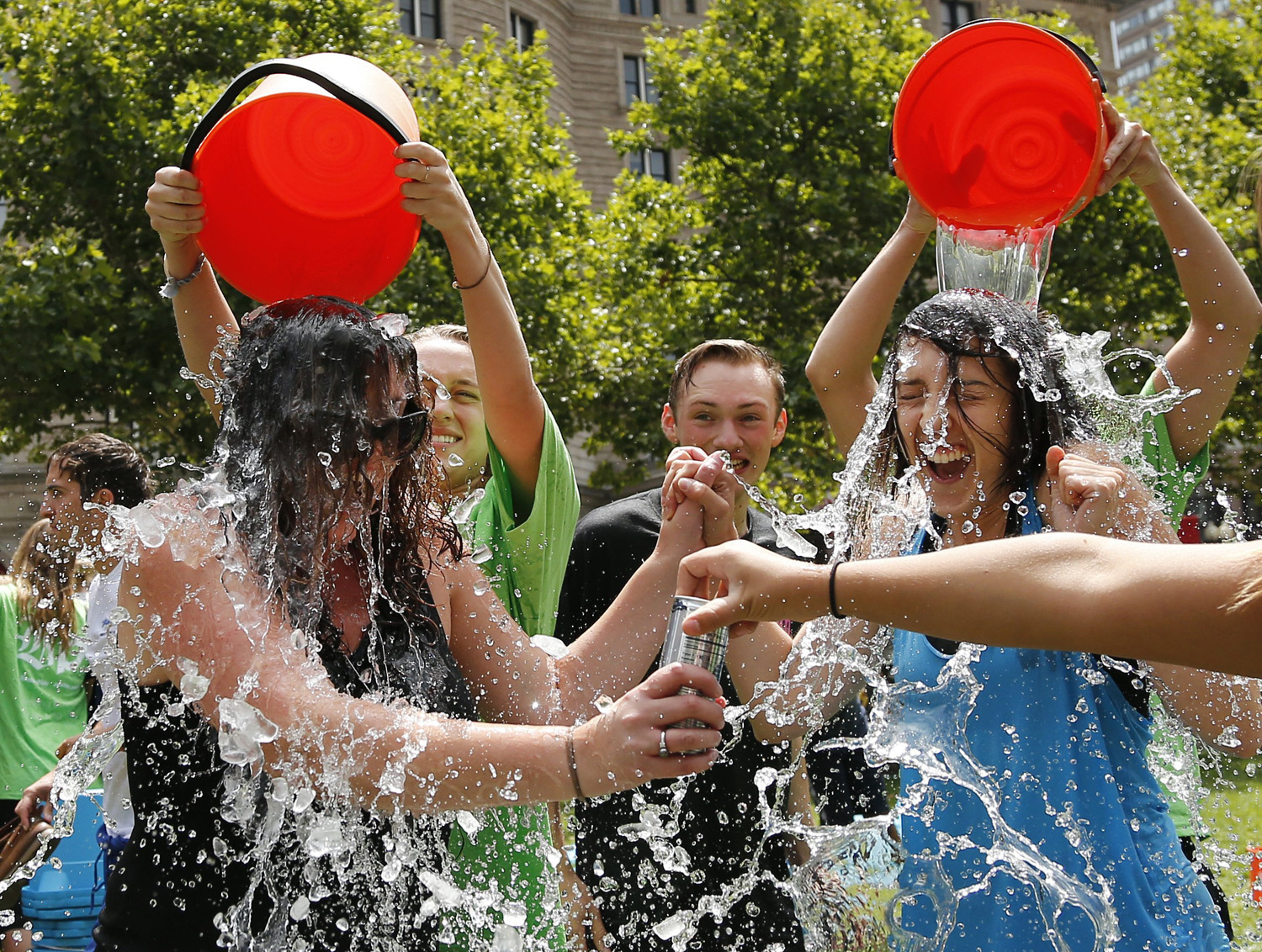
With much gratitude, somehow my weekend Facebook thread was remarkably free of ALS Ice Bucket Challenge videos. A friend with whom I spent the weekend was not so lucky. Every time she looked at Facebook she exclaimed “Another one! Another one. Oh my God. Sheryl Sandberg! Oh my God! Bill Gates! Russell Crowe! Justin Timberlake!” I actually watched Justin Timberlake’s, not because I am obsessed with Justin Timberlake, but because I found him somehow the most surprising. But he really took to ice water, well, I guess the way a duck takes to regular water.
But my friend and I found ourselves ultimately irritated by the ALS challenge, which has shown no signs of fading. We wondered why. How could we object to an organization raising $80 million dollars to help combat a terrible disease? Charitable fundraising is not a frivolous pursuit. Plus, I myself had done many only-charitable-to-myself frivolous things this weekend. I flew in an airplane. I ate food out of takeout containers. I swam in a lovely pool.
Still exploring our irritation, my friend and I watched one particular video of a woman standing in front of her Malibu beach house, screaming as the icy water fell on her head. I’d seen and heard other ALS Ice Bucketeers scream, but this one was particularly bloodcurdling. In that scream, I knew why the ALS Ice Bucket Challenge rubbed me the wrong way.
At any given time, many people on the planet are enduring war and famine and violence. I don’t think I’m going out on a limb when I say that in the last few weeks the news been especially awful. Around 2,000 Palestinians and 66 Israelis have died in Gaza since that conflict flared up. In our very own country, a police officer shot an unarmed 18-year-old boy, six times. This morning, Sudanese rebels shot down a U.N. helicopter.
And here we are in America dumping ice water on our heads, which, I insist, is more than just harmless fun for a good cause. It is disrespectful to the literally millions of people in the world who are, as I type and you read, in actual physical pain. To then post that experience in public forum is essentially kind of a subtle form of bragging. “My life is so without trauma that I find creating moments of trauma exhilarating, and hilarious.” The fact that there are hundreds of thousands of Americans creating and sharing these videos suggests that we as a nation are making the same boast.
Do I think everyone who did the ALS challenge is a terrible person? Of course not. Do I think that there’s another way that ALS could have raised all that money so fast? Unlikely. It’s certainly better for the ALS Association and the approximately 30,000 Americans who have ALS that this happened. That said, I shudder to think about what we look like dumping freezing cold water over our heads while so much of the world at this time is plunged into acute suffering over which they have no control. Not to mention the fact that we are also in the middle of an historic drought, and most of the challenge water is from the tap, not the toilet or another used source (an exception being Matt Damon, who rightly called dumping clean water on his head “a little crazy”).
Imagine being a suffering person in the world, watching Americans spend the weekend dumping water on their heads as a quixotic impetus to give—or to avoid giving? Which is it?—money. In Gaza, having bombs drop all around you and sharing the one remaining jug of water left in your kitchen with four other people. In Ferguson, Missouri.
I am not saying that Americans should have spent their weekends in hair shirts, flagellating themselves. But if we’re going to be excited about having this connected world, we need to act like citizens of that world and try to be aware that there are other people living in it, whose experience is absolutely nothing like ours. And with that realization, it might be nice to just quietly, without screaming or wasting, send someone who has less than you, someone who suffers more, a check. Just because.
Sarah Miller also writes for NewYorker.com and The Hairpin, among other outlets, and has published two novels, Inside the Mind of Gideon Rayburn and The Other Girl.
More Must-Reads From TIME
- The 100 Most Influential People of 2024
- The Revolution of Yulia Navalnaya
- 6 Compliments That Land Every Time
- What's the Deal With the Bitcoin Halving?
- If You're Dating Right Now , You're Brave: Column
- The AI That Could Heal a Divided Internet
- Fallout Is a Brilliant Model for the Future of Video Game Adaptations
- Want Weekly Recs on What to Watch, Read, and More? Sign Up for Worth Your Time
Contact us at letters@time.com